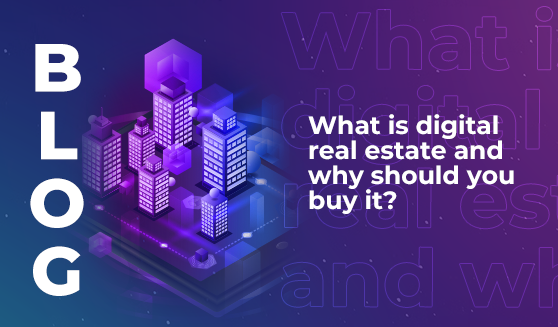
Why sustainability is the heart of the smart city revolution
The smart cities of the future will use tech to lower emissions, cut urban temperatures, and improve quality of life in highly populated areas.


Digital real estate (also known as digital property) refers to any virtual properties or online assets that have monetary value. They can be bought, sold, leased, or monetised through other means, such as subscription-based access; and common forms of digital property include domain names, websites, and mobile apps.
Increasingly, digital real estate is taking on a meaning that’s more in line with real-world real estate. Virtual land within metaverse platforms like The Sandbox and Decentraland is being snapped up by investors who recognise the value potential of owning pieces of the metaverse in the future.
Back in 2022 we wrote about the virtual land that was being bought and sold for millions in the speculative rush to invest. Now, we’re revisiting the virtual property landscape to understand how the market has changed – and whether or not it’s a good investment decision.
According to data from Expert Market Research, the global metaverse real estate market size reached an approximate value of USD $1.69 billion in 2023, and is projected to grow at a CAGR of 48.60% until 2032 – when it’ll hit $59.83 billion.
And the consumer-facing aspect of the market has become more sophisticated over the last couple of years. Increasingly, users are able to explore virtual locations much like they would a physical property, allowing them to consider the design, layout, and ambience of the real estate before they decide to buy.
While hype around the metaverse has calmed since 2022, digital assets and the ownership of virtual real estate have continued to rise in popularity. Businesses and solo investors are buying virtual land; and some enterprises are renting out their assets to others, for use cases including building virtual stores and organising digital events.
Seven top reasons for investing in digital assets are:
All investments carry risk – and digital real estate is no exception.
The most important factor to consider when you’re deciding if virtual real estate investments will suit your personal risk tolerance is that the market can be highly volatile. At this stage, digital real estate markets are significantly less predictable than traditional real estate, and the picture is changing all the time.
Shifts in tech markets and digital economies can ripple through the value of virtual assets very quickly. If you decide to buy virtual assets as an investment, you have to be comfortable with a relatively high level of risk that your ROI projections may not come to fruition.
Managing digital properties also requires certain technological skills. It’s OK if you don’t have that expertise yourself – but you need to make sure you’ve got the right people on your team to maximise the potential of those investments.
And as it stands, the digital real estate market isn’t bound by regulations in the same way that physical real estate is. You need to know how to adequately protect yourself from fraud and potential regulatory pitfalls moving forward.
At LEAP, we connect with investors who recognise the potential of these investments and embrace the risks. If you’re considering investing in virtual assets, we recommend you connect with others too – seek trusted sources of information and build your knowledge before you start building your portfolio.

The smart cities of the future will use tech to lower emissions, cut urban temperatures, and improve quality of life in highly populated areas.

Discover the cities that rank highly for smart city preparedness, and learn why locally relevant innovation is more important than cutting-edge tech.

If you’ve ever thought about becoming a tech investor, read this – learn why investors are the quiet force shaping the future of the industry.

The smart cities of the future will use tech to lower emissions, cut urban temperatures, and improve quality of life in highly populated areas.

Discover the cities that rank highly for smart city preparedness, and learn why locally relevant innovation is more important than cutting-edge tech.

If you’ve ever thought about becoming a tech investor, read this – learn why investors are the quiet force shaping the future of the industry.